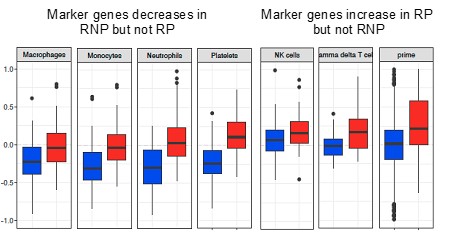Session Information
Date: Tuesday, November 14, 2023
Title: Abstracts: RA – Diagnosis, Manifestations, & Outcomes III: Predicting & Optimizing Outcomes
Session Type: Abstract Session
Session Time: 2:00PM-3:30PM
Background/Purpose: This study aimed to determine predictors of treatment response and radiographic progression following the initiation of biological disease-modifying antirheumatic medications (bDMARDs) in patients with rheumatoid arthritis (RA).
Methods: RNAseq was performed on peripheral blood mononuclear cells (PBMCs) taken before and 3 months after bDMARD initiation. Treatment response was defined as good EULAR response (change in DAS28 >1.2 if the DAS28 was >3.2) and radiographic progression was defined as increase in modified total sharp score (mTSS) of more than 0.5, 3.4, or 5.
Results: A total of 41 patients with RA were evaluated (meanage: 63.1 years; 75.6% are females). Radiographic progression was observed 60% of patients and was significantly less common in patients with a good EULAR response. Innate immune pathways, were significantly enriched at baseline in patients without radiographic progression, while genes atypical of immune cells, such as genes related to GO_mesoderm_developement, were upregulated in radiographic progressors, using various thresholds of mTSS change, suggesting enrichment of mesenchymal signature genes. In longitudinal analysis, Preinflammatory mesenchymal (PRIME) cell signature genes showed signifcant enrichment in radiographic progressors and poor treatment responders. In patients with no radiographic progression, innate immune cell, such as neutrophil, monocyte, and platelet, marker genes decreased significantly at 3 months compared to baseline, while they remained unchanged in patients with radiographic progression. On the other hand, in patients with radiographic progression, PRIME cell genes as well as NK and gdT cell genes increased significantly at 3 months compared to baseline, while they remained unchanged in those without radiographic progression (Figure 1).
Conclusion: PBMC innate immune gene signature are increased at baseline and decrease with treatment in patients no radiographic progression. On the other hand, PRIME cell genes are increased at baseline and increase further with treatment in patients with radiographic progression.
To cite this abstract in AMA style:
Fujii T, Orange D, Hale C, Murata K, Onizawa H, Onishi A, Tanaka M, Morinobu A, Matsuda S. Preinflammatory Mesenchymal (PRIME) Cell Signature Genes Enrichment Predicts Treatment Response and Joint Prognosis in Rheumatoid Arthritis [abstract]. Arthritis Rheumatol. 2023; 75 (suppl 9). https://acrabstracts.org/abstract/preinflammatory-mesenchymal-prime-cell-signature-genes-enrichment-predicts-treatment-response-and-joint-prognosis-in-rheumatoid-arthritis/. Accessed .« Back to ACR Convergence 2023
ACR Meeting Abstracts - https://acrabstracts.org/abstract/preinflammatory-mesenchymal-prime-cell-signature-genes-enrichment-predicts-treatment-response-and-joint-prognosis-in-rheumatoid-arthritis/

